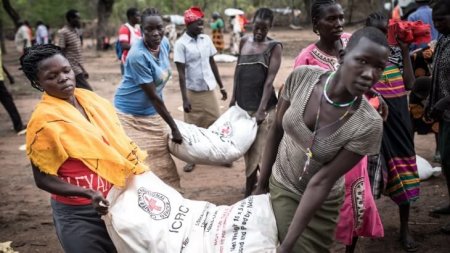
The ICRC interviewed 4,200 people and held 55 focus group discussions. It distributed seeds and farming tools together with the South Sudan Red Cross to over 400,000 people in 2020 and conducted the assessment to understand the impact of this assistance.
“People are tired of depending on aid. They want to live in dignity and provide for themselves and their families,” said Robert Mardini, Director General of the ICRC, during his visit to the country. “Our assessment shows that climate shocks, combined with continuing conflict and armed violence, make the transition for communities from receiving food assistance to independent food production extremely difficult.
As the lean season begins, tens of thousands of families, especially in Jonglei, Upper Nile, Warrap, Unity and Lakes States, are struggling for survival without an adequate harvest from 2020 and following the loss of other food reserves to conflict, armed violence and floods. In the Equatoria States, communities also face a heightened risk of hunger after thousands of people fled their homes, losing crops and livestock due to ongoing conflict.”
“The COVID-19 pandemic is a crisis on top of a very fragile situation. It is not the main concern of many communities already facing multiple hardships, often over years or decades,” said Mardini. “Whilst we have adapted our humanitarian action to include COVID-19 preventive measures, the pandemic has deepened existing vulnerabilities especially in the health care system, which has been weakened or destroyed by decades of conflict and armed violence.”
A renewed outbreak of armed violence or the intensification of conflict would increase the chance of immediate, life-threatening food shortages for hundreds of thousands of South Sudanese. Combined with the impact of COVID-19 and climatic shocks, many South Sudanese in remote and vulnerable communities face challenging months ahead in 2021.
Source: ICRC







